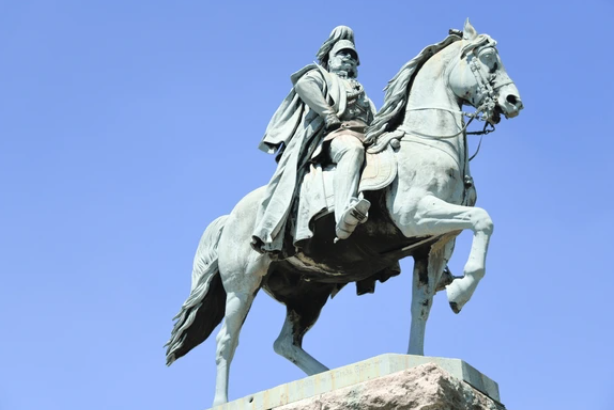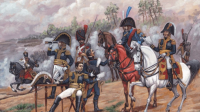Introduction: The Rise of a Monarch
The ascension of Wilhelm I to the throne of Prussia in 1861 marked the beginning of a transformative period in European history. Wilhelm I, who would later become the first German Emperor, played a pivotal role in shaping the political landscape of 19th-century Europe. His reign, which saw the unification of Germany and the establishment of the German Empire, was characterized by significant military and political developments. Wilhelm I’s leadership, in partnership with his Chancellor Otto von Bismarck, laid the foundations for the modern German state and altered the balance of power in Europe.
Read Also : First Schleswig War (1848-1851): The Prelude to a Larger Conflict
The Historical Context: Prussia Before Wilhelm I
Before Wilhelm I ascended to the throne, Prussia was already a formidable power in Europe, but it was not yet the dominant force it would become. The early 19th century had seen Prussia grow in strength, particularly after its role in the defeat of Napoleon and the subsequent Congress of Vienna in 1815. However, the political and social landscape of Prussia was still evolving, with significant challenges and opportunities on the horizon.
The Legacy of Frederick William III and IV
Wilhelm I’s predecessors, Frederick William III and Frederick William IV, had both left their mark on Prussia, but their reigns were also marked by challenges and missed opportunities. Frederick William III’s reign was shaped by the Napoleonic Wars and the subsequent reorganization of Prussia, which included significant military and administrative reforms. These reforms laid the groundwork for Prussia’s future military successes, but they also highlighted the need for further modernization and political change.
Frederick William IV, who ruled from 1840 to 1861, was a more complex figure. Known for his artistic and intellectual interests, Frederick William IV was also a conservative monarch who resisted the growing demands for liberal reforms and a constitution. His reluctance to embrace political change led to significant unrest, including the 1848 Revolutions, which saw widespread demands for greater political participation and national unification across the German states.
The reigns of Frederick William III and IV set the stage for the challenges Wilhelm I would face as king. The need for modernization, political reform, and national unification were pressing issues that would define Wilhelm’s reign and the future of Prussia.
The Prussian Army: A Force to Be Reckoned With
One of Prussia’s greatest strengths at the time of Wilhelm I’s ascension was its military. The Prussian army, known for its discipline, organization, and effectiveness, had become one of the most respected military forces in Europe. The reforms initiated by Frederick William III and carried out by military leaders such as Gerhard von Scharnhorst and August von Gneisenau had transformed the Prussian army into a model of military efficiency.
However, by the time Wilhelm I became king, there was a growing recognition that further reforms were needed to keep the Prussian military at the forefront of European powers. The challenges posed by the rapidly changing nature of warfare, the need for a larger and more modern army, and the political implications of military power were all issues that Wilhelm would have to address during his reign.
The state of the Prussian military was a key factor in Wilhelm I’s rise to power, as it would play a central role in his efforts to unify Germany and establish Prussia as the dominant power in Europe. The success of these efforts would depend on Wilhelm’s ability to lead and reform the army while navigating the complex political landscape of the time.
The Political Landscape of the German Confederation
At the time of Wilhelm I’s ascension, the German Confederation was a loose association of German-speaking states, including Prussia, Austria, Bavaria, and many smaller principalities. The Confederation had been established by the Congress of Vienna in 1815 as a means of maintaining stability in central Europe after the Napoleonic Wars. However, the Confederation was marked by deep divisions and competing interests, particularly between Prussia and Austria, the two largest and most powerful states.
The question of German unification was a central issue in the political landscape of the German Confederation. Many Germans, inspired by the ideals of nationalism and liberalism, sought the creation of a unified German state. However, the path to unification was far from clear, with significant disagreements over whether a unified Germany should be led by Austria or Prussia, and whether it should be a constitutional monarchy or a more centralized, authoritarian state.
Wilhelm I’s ascension to the throne came at a time of growing tension within the German Confederation, as Prussia and Austria vied for dominance. The question of who would lead the unification of Germany, and on what terms, would be one of the defining issues of Wilhelm’s reign.
The Role of Otto von Bismarck
Otto von Bismarck, who would become Wilhelm I’s most trusted advisor and Chancellor, played a crucial role in shaping the political landscape of Prussia and the German Confederation. Bismarck, a skilled diplomat and strategist, was deeply committed to the idea of German unification under Prussian leadership. He believed that Prussia’s future as a great power depended on its ability to unify the German states and to challenge Austria’s dominance in central Europe.
Bismarck’s relationship with Wilhelm I would prove to be one of the most important partnerships in modern European history. Together, they would navigate the complex political challenges of the time, using a combination of diplomacy, military force, and political maneuvering to achieve their goals. Bismarck’s vision of a unified Germany, achieved through “blood and iron,” would come to define Wilhelm’s reign and the future of Europe.
The partnership between Wilhelm I and Bismarck would be central to the success of Prussia’s efforts to unify Germany and to establish itself as the dominant power in Europe. Their combined leadership would shape the course of European history for decades to come.
Wilhelm I’s Ascension to the Throne: A New Chapter for Prussia
Wilhelm I’s ascension to the throne of Prussia on January 2, 1861, marked the beginning of a new chapter in Prussian and German history. Wilhelm, who was 64 years old at the time, had spent much of his life in the military and was known for his conservative views and commitment to the monarchy. However, his reign would be anything but conservative, as he embarked on a series of ambitious reforms and military campaigns that would change the course of European history.
The Challenges Facing Wilhelm I
As Wilhelm I ascended to the throne, he faced a number of significant challenges. Prussia was a powerful state, but it was also a state in need of reform. The military, while strong, required modernization to keep pace with the changing nature of warfare. The political landscape of the German Confederation was fraught with tension, as the question of German unification loomed large. Additionally, Wilhelm faced domestic challenges, including demands for liberal reforms and greater political participation.
Wilhelm’s conservative instincts initially led him to resist many of these demands for change. However, he quickly realized that maintaining the status quo would not be enough to secure Prussia’s future. The challenges facing Prussia required bold and decisive action, and Wilhelm would prove to be a king who was willing to take such action.
One of Wilhelm’s first acts as king was to address the need for military reform. He believed that a strong and modern army was essential to Prussia’s security and to its ability to play a leading role in the German Confederation. However, his efforts to expand and modernize the army met with resistance from the Prussian parliament, leading to a constitutional crisis that would shape the early years of his reign.
The Constitutional Crisis of the 1860s
Wilhelm I’s efforts to reform the Prussian military led to a significant constitutional crisis in the early 1860s. The king’s plan to expand the army and increase military spending was met with strong opposition from the Prussian parliament, which refused to approve the necessary funds. This led to a deadlock between the monarchy and the parliament, with neither side willing to back down.
The constitutional crisis threatened to undermine Wilhelm’s authority and to weaken Prussia’s position within the German Confederation. However, it also provided an opportunity for Wilhelm to assert his leadership and to demonstrate his commitment to the principles of monarchy and military strength.
In response to the crisis, Wilhelm appointed Otto von Bismarck as his Chancellor in 1862. Bismarck, who shared Wilhelm’s commitment to a strong military and a powerful monarchy, quickly moved to resolve the crisis. He bypassed the parliament and implemented the military reforms through royal decree, arguing that the needs of the state outweighed the concerns of the legislature.
Bismarck’s actions, supported by Wilhelm, effectively ended the constitutional crisis and allowed the military reforms to proceed. However, the crisis also highlighted the tensions between the monarchy and the parliament, and it set the stage for the more authoritarian style of governance that would characterize Wilhelm’s reign.
The Reform of the Prussian Army
One of Wilhelm I’s most significant achievements as king was the reform of the Prussian army. The military reforms initiated during his reign laid the groundwork for Prussia’s later military successes and played a crucial role in the unification of Germany.
The reforms included the expansion of the army, the introduction of new technologies and tactics, and the reorganization of the military command structure. The goal was to create a modern and professional army that could respond quickly and effectively to any threat. These reforms were driven by Wilhelm’s belief in the importance of military strength and his desire to ensure that Prussia remained a leading power in Europe.
The reform of the Prussian army was not just about increasing its size or improving its capabilities; it was also about ensuring that the military remained loyal to the monarchy and that it could be used as a tool of state power. Wilhelm and Bismarck recognized that a strong and loyal army was essential to achieving their political goals, including the unification of Germany.
The success of the military reforms was evident in the later wars of unification, where the Prussian army demonstrated its superiority on the battlefield. The reforms also helped to solidify Wilhelm’s authority as king and to strengthen Prussia’s position within the German Confederation.
The Role of Otto von Bismarck in Wilhelm’s Reign
Otto von Bismarck played a central role in Wilhelm I’s reign, serving as the king’s most trusted advisor and Chancellor. Bismarck’s vision of German unification, achieved through military strength and political maneuvering, aligned closely with Wilhelm’s own goals for Prussia.
Bismarck’s role in resolving the constitutional crisis of the 1860s and implementing the military reforms was just the beginning of his influence on Wilhelm’s reign. He would go on to orchestrate a series of diplomatic and military campaigns that would lead to the unification of Germany and the establishment of the German Empire.
The partnership between Wilhelm and Bismarck was based on mutual respect and a shared commitment to the principles of monarchy and state power. While Wilhelm was the king, Bismarck was often the driving force behind the major decisions of the reign, using his diplomatic skills and strategic vision to achieve their shared goals.
Bismarck’s influence on Wilhelm’s reign cannot be overstated. His ability to navigate the complex political landscape of Europe and to use military force as a tool of statecraft was instrumental in the success of Prussia and the unification of Germany. The partnership between Wilhelm and Bismarck would come to define the era and shape the future of Europe.
The Wars of Unification: Wilhelm I’s Role in Shaping Germany
The reign of Wilhelm I was marked by a series of wars that ultimately led to the unification of Germany and the creation of the German Empire. These wars, often referred to as the Wars of Unification, were driven by a combination of military strength, diplomatic maneuvering, and nationalist sentiment. Wilhelm I, with the support of Bismarck, played a central role in these conflicts, using them as a means to achieve his goal of a unified and powerful Germany.
The Danish War (1864): The First Step Toward Unification
The first of the Wars of Unification was the Danish War of 1864, also known as the Second Schleswig War. The conflict arose from a long-standing dispute over the duchies of Schleswig and Holstein, which were claimed by both Denmark and the German Confederation.
Wilhelm I and Bismarck saw the Danish War as an opportunity to assert Prussia’s leadership within the German Confederation and to strengthen its position in the struggle for German unification. The war was also a test of the newly reformed Prussian army, which had been modernized and expanded under Wilhelm’s reign.
The Danish War ended in a decisive victory for Prussia and its ally Austria, with Denmark ceding control of Schleswig and Holstein to the German Confederation. The war demonstrated the effectiveness of the Prussian military and solidified Prussia’s leadership within the Confederation. It was the first major step toward the unification of Germany, setting the stage for the more significant conflicts to come.
The Austro-Prussian War (1866): The Struggle for German Leadership
The Austro-Prussian War of 1866, also known as the Seven Weeks’ War, was the second of the Wars of Unification and a pivotal moment in the struggle for German leadership. The war was fought between Prussia and Austria, along with their respective allies, over the control of the German Confederation and the future of German unification.
Wilhelm I and Bismarck recognized that Austria’s influence within the German Confederation was the primary obstacle to Prussia’s goal of unification. The Austro-Prussian War was therefore a strategic move to remove Austria from German affairs and to establish Prussia as the dominant power in the German-speaking world.
The war ended in a decisive victory for Prussia, with the Treaty of Prague formalizing Austria’s exclusion from the German Confederation and the dissolution of the Confederation itself. The victory also led to the creation of the North German Confederation, a new political entity dominated by Prussia and a key step toward the eventual unification of Germany.
The Austro-Prussian War was a turning point in European history, as it marked the rise of Prussia as a dominant power and the beginning of the end for Austrian influence in central Europe. The war also demonstrated the effectiveness of Bismarck’s Realpolitik and the military strength of Prussia under Wilhelm’s leadership.
The Franco-Prussian War (1870-1871): The Birth of the German Empire
The final and most significant of the Wars of Unification was the Franco-Prussian War of 1870-1871. This conflict was the culmination of Wilhelm I and Bismarck’s efforts to unify Germany under Prussian leadership, and it led directly to the creation of the German Empire.
The Franco-Prussian War was sparked by a diplomatic dispute between Prussia and France, which Bismarck skillfully manipulated to provoke a French declaration of war. The war was characterized by rapid and decisive Prussian victories, as the newly unified North German Confederation and its southern German allies overwhelmed the French forces.
The war ended with the capture of Paris and the signing of the Treaty of Frankfurt, which imposed harsh terms on France and solidified Prussia’s dominance in Europe. The most significant outcome of the war, however, was the proclamation of the German Empire in January 1871, with Wilhelm I being crowned as the first German Emperor (Kaiser) in the Hall of Mirrors at the Palace of Versailles.
The Franco-Prussian War was the culmination of Wilhelm I’s efforts to unify Germany and to establish Prussia as the leading power in Europe. The creation of the German Empire marked the beginning of a new era in European history, with Germany emerging as a major industrial and military power.
The Legacy of Wilhelm I: The Architect of German Unification
Wilhelm I’s reign as King of Prussia and later as the first German Emperor was one of the most significant periods in European history. His leadership, in partnership with Otto von Bismarck, led to the unification of Germany and the establishment of the German Empire, a state that would play a central role in the events of the 20th century.
The Creation of the German Empire
The unification of Germany under Prussian leadership was the crowning achievement of Wilhelm I’s reign. The creation of the German Empire in 1871 marked the culmination of decades of effort to bring together the German-speaking states into a single, powerful nation. The empire, with Wilhelm as its first emperor, became one of the leading powers in Europe and a major player on the global stage.
The German Empire was characterized by its strong central government, its powerful military, and its industrial and economic strength. Under Wilhelm I and Bismarck, the empire pursued a policy of Realpolitik, using diplomacy and military force to achieve its goals and to maintain its position as a leading power in Europe.
The creation of the German Empire also had significant implications for the balance of power in Europe, as it disrupted the existing alliances and rivalries among the European states. The rise of Germany as a major power would have far-reaching consequences for the continent, ultimately leading to the tensions and conflicts that would culminate in the First World War.
Wilhelm I’s Relationship with Bismarck
The partnership between Wilhelm I and Otto von Bismarck was one of the most important in modern European history. Together, they navigated the complex political landscape of 19th-century Europe, using a combination of diplomacy, military strength, and political maneuvering to achieve their goals.
Wilhelm I trusted Bismarck implicitly, giving him significant authority to carry out his policies and to manage the affairs of the state. Bismarck, in turn, was fiercely loyal to Wilhelm and worked tirelessly to advance the king’s vision for Prussia and Germany. Their partnership was based on mutual respect and a shared commitment to the principles of monarchy and state power.
The success of their partnership was evident in the unification of Germany and the creation of the German Empire. Bismarck’s ability to manage the complex politics of Europe and to use military force effectively was instrumental in achieving these goals. However, the partnership also had its challenges, as Wilhelm and Bismarck did not always agree on the best course of action. Despite these differences, their collaboration remained strong, and their combined efforts shaped the future of Europe.
Wilhelm I’s Impact on European History
Wilhelm I’s impact on European history extends far beyond the borders of Germany. His reign marked the rise of a unified German state, which would go on to play a central role in the events of the 20th century. The unification of Germany under Wilhelm’s leadership disrupted the balance of power in Europe and set the stage for the conflicts that would follow.
Wilhelm’s legacy is also reflected in the military and political strategies that he and Bismarck employed to achieve their goals. The use of military force as a tool of statecraft, the emphasis on a strong and centralized state, and the pursuit of national unification through Realpolitik all became hallmarks of modern European history.
The impact of Wilhelm I’s reign can also be seen in the broader context of European nationalism and state-building. The unification of Germany inspired other nationalist movements across Europe, leading to the eventual unification of Italy and the rise of nationalist sentiments in other parts of the continent. Wilhelm’s success in unifying Germany also demonstrated the power of nationalism as a force for political change, a lesson that would be learned by future generations of European leaders.
Conclusion: The Enduring Legacy of Wilhelm I
Wilhelm I’s reign as King of Prussia and German Emperor was a period of profound change and transformation in European history. His leadership, in partnership with Otto von Bismarck, led to the unification of Germany and the creation of the German Empire, a state that would become one of the leading powers in Europe.
The legacy of Wilhelm I is evident in the modern history of Germany and Europe. The unification of Germany under his leadership marked the beginning of a new era in European politics, with Germany emerging as a major industrial and military power. The strategies and policies employed by Wilhelm and Bismarck continue to be studied and analyzed by historians and political scientists, as they offer valuable insights into the nature of state-building, diplomacy, and military strategy.
Wilhelm I’s reign also serves as a reminder of the complex and often unpredictable nature of history. The unification of Germany, which seemed unlikely at the beginning of Wilhelm’s reign, was achieved through a combination of vision, determination, and strategic thinking. The lessons of Wilhelm I’s reign continue to resonate today, as Europe and the world grapple with the challenges of nationalism, state-building, and international relations.
FAQ About Wilhelm I and His Reign
Who was Wilhelm I?
Wilhelm I was the King of Prussia from 1861 to 1888 and the first German Emperor (Kaiser) from 1871 to 1888. He played a central role in the unification of Germany and the creation of the German Empire, working closely with his Chancellor, Otto von Bismarck.
What were Wilhelm I’s major achievements?
Wilhelm I’s major achievements include the unification of Germany, the creation of the German Empire, and the modernization of the Prussian military. His reign was marked by a series of successful wars, including the Danish War, the Austro-Prussian War, and the Franco-Prussian War, which ultimately led to the unification of Germany under Prussian leadership.
How did Wilhelm I contribute to the unification of Germany?
Wilhelm I contributed to the unification of Germany through his leadership and support for military and diplomatic efforts to bring the German states together under Prussian leadership. His partnership with Otto von Bismarck was instrumental in achieving this goal, as they used a combination of military force, diplomacy, and political maneuvering to unify the German states and create the German Empire.
What was the relationship between Wilhelm I and Otto von Bismarck?
Wilhelm I and Otto von Bismarck had a close and effective partnership, with Wilhelm trusting Bismarck to manage the affairs of the state and to carry out his vision for Prussia and Germany. Bismarck, in turn, was loyal to Wilhelm and worked tirelessly to achieve their shared goals. Their partnership was central to the success of the unification of Germany and the creation of the German Empire.
What is the legacy of Wilhelm I?
The legacy of Wilhelm I includes the unification of Germany, the creation of the German Empire, and the modernization of the Prussian military. His reign marked the rise of Germany as a major power in Europe and had a lasting impact on the balance of power in Europe. The strategies and policies employed by Wilhelm and Bismarck continue to be studied and analyzed by historians and political scientists.







2 comments